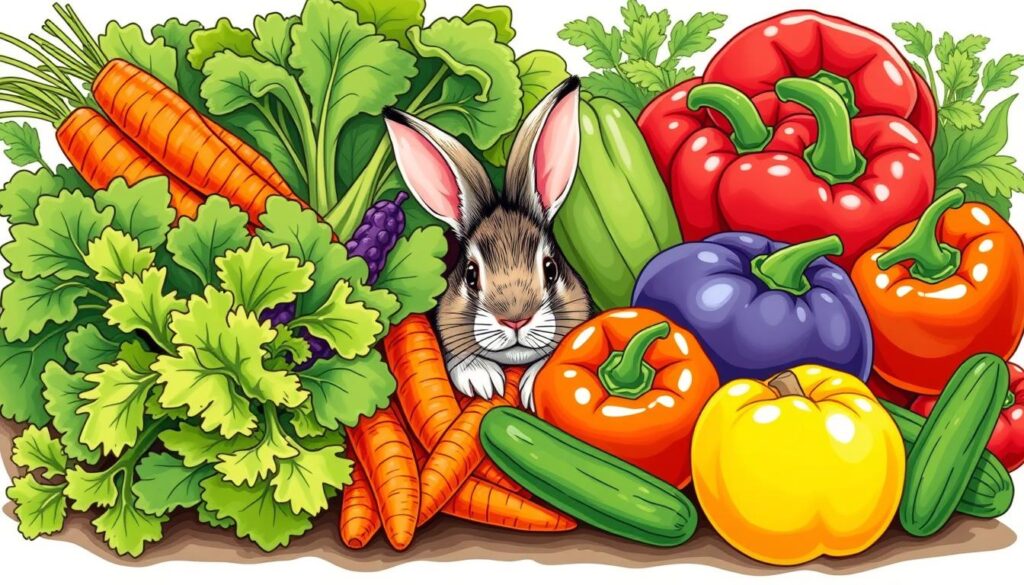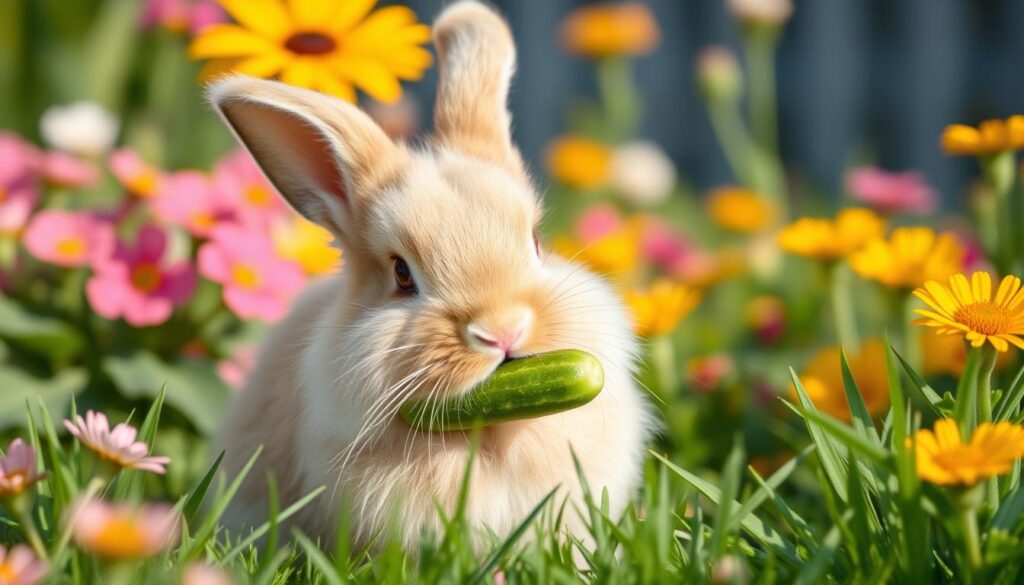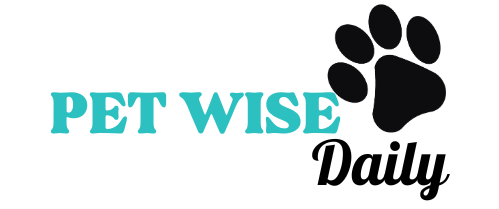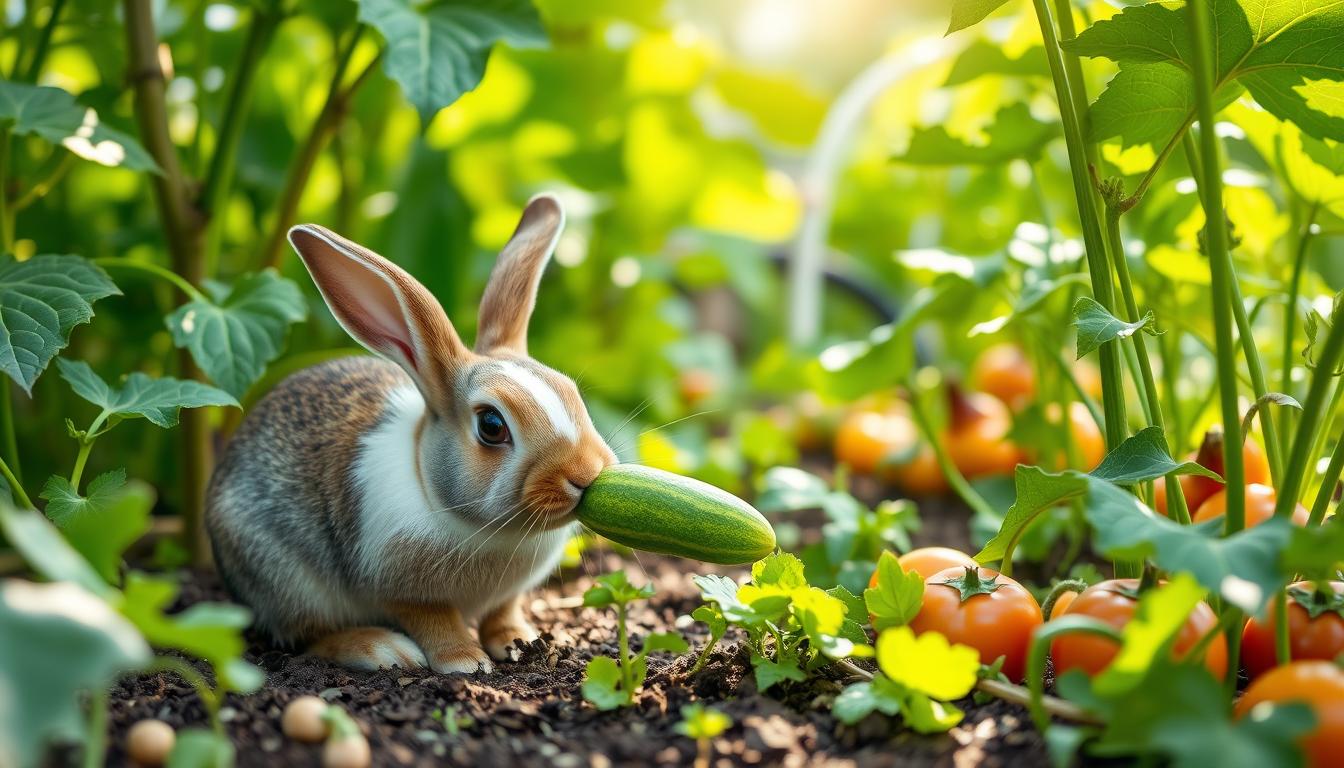As a responsible rabbit owner, you might wonder, “Can rabbits have cucumbers?” The answer is yes, but with some important guidelines. Cucumbers can be a safe and hydrating treat for your furry friend. It’s key to know how to add them to your rabbit’s diet correctly. This guide will cover the nutritional value of cucumbers, safe feeding practices, and the benefits and risks of adding this refreshing veggie to your rabbit’s meals.
Table of Contents
Understanding Rabbit Diet Basics
Creating a healthy diet for your rabbit is key to their health. Rabbits are herbivores, needing a diet different from other pets. Knowing what makes up a good rabbit diet is vital.
Essential Components of a Healthy Rabbit Diet
Rabbits should eat mostly Timothy or Orchard grass hay, 70-80% of their diet. Leafy green veggies should make up 15-20% of their food. A small amount of rabbit pellets, 5-10%, can fill any nutritional gaps.
Daily Nutritional Requirements
- Fiber: Rabbits need a lot of fiber for a healthy gut.
- Protein: They require a moderate amount of protein, about 12-16% of their diet.
- Vitamins and Minerals: Vitamins A, C, and E, and minerals like calcium and phosphorus, are key for their health.
The Importance of Hay and Fresh Water
Hay is vital for a rabbit’s diet, aiding digestion and dental health. They should always have access to high-quality hays like Timothy, Orchard, or Meadow hay. Also, fresh, clean water is crucial for their hydration and health.
“A balanced rabbit diet is the foundation for a healthy, happy bunny.”
Can Rabbits Have Cucumbers
Yes, rabbits can safely enjoy cucumbers as an occasional treat. Cucumbers are non-toxic and can provide a refreshing source of hydration for your furry friend. However, it’s important to introduce cucumbers to your rabbit’s diet gradually and in moderation. This is because their high water content and low nutritional value can potentially cause digestive upset if consumed in excess.
When it comes to rabbit-friendly foods, fresh, raw cucumbers are a great option. In fact, all parts of the cucumber plant, including the leaves and flowers, are safe for rabbits to consume. Just be sure to wash the produce thoroughly to remove any potential vegetable safety concerns.
To incorporate cucumbers into your rabbit’s balanced diet, start with small slices or pieces, and monitor their reaction closely. If your rabbit tolerates the cucumber well, you can gradually increase the portion size over time. Remember, can rabbits have cucumbers in moderation, as part of a diverse and nutritious diet.
| Nutrient | Amount per Spear of Pickles |
|---|---|
| Calories | 4 |
| Carbohydrates | 0.08g |
| Fiber | 0.3g |
| Sodium | 283g |
| Protein | 0.2g |
| Sugar | 0.4g |
While cucumbers can be a refreshing treat, it’s important to remember that they should not replace the essential components of a rabbit’s diet. This includes hay, pellets, and a variety of fresh leafy greens. By offering cucumbers in moderation and as part of a balanced diet, you can provide your rabbit with a nutritious and enjoyable feeding experience.
“Cucumbers are a great source of hydration for rabbits, but they should be fed in moderation as part of a varied and balanced diet.”
Nutritional Value of Cucumbers for Rabbits
Cucumbers can be a healthy treat for your rabbit. They are refreshing and help keep your rabbit hydrated. But, they are not the most nutrient-dense food.
Vitamins and Minerals in Cucumbers
Cucumbers have vitamins and minerals that are good for your rabbit. They have vitamin K for blood clotting and vitamin C as an antioxidant. They also have potassium and magnesium for muscle and nerve health.
Water Content and Hydration Benefits
Cucumbers are very wet, with over 90% water. This makes them great for keeping your rabbit hydrated. They are especially good during hot weather or if your rabbit doesn’t drink enough water.
Fiber Content Analysis
Cucumbers have some fiber, mostly in the skin. But, they are not a high-fiber food. Rabbits need a lot of fiber from hay to stay healthy. Eating too many cucumbers can upset their fiber balance.
| Nutrient | Amount in Cucumbers |
|---|---|
| Water | 95% |
| Fiber | 0.5 g per 100 g |
| Vitamin K | 16.4 μg per 100 g |
| Vitamin C | 2.8 mg per 100 g |
| Potassium | 147 mg per 100 g |
| Magnesium | 10 mg per 100 g |
Remember, cucumbers are a healthy snack for rabbits but should be given in small amounts. They should be part of a balanced diet with lots of hay, fresh veggies, and a little bit of pellets.
Safe Feeding Guidelines and Portions
Feeding your rabbit right is crucial. Cucumbers can be a tasty and hydrating treat. But, they should be given in small amounts as part of a balanced diet. It’s best to offer cucumbers as an occasional treat, not more than 5% of their total food intake.
Just a few small slices of cucumber a week is enough. Make sure to wash the cucumber well before giving it to your rabbit. This ensures it’s clean and free from harmful substances.
When introducing new foods, start with small amounts. Watch your rabbit closely for any signs of upset stomach. Cucumbers should not replace the main foods in your rabbit’s diet. These should include high-quality hay, fresh leafy greens, and a small amount of rabbit pellets.
“Variety is the spice of life, and this holds true for your rabbit’s diet as well. Offering a wide range of safe, nutrient-dense vegetables and occasional fruits can help ensure your rabbit receives all the essential vitamins, minerals, and fiber they need to thrive.”
Every rabbit is different, and their diet needs can vary. Always talk to your vet for advice on how much to feed, safe treats, and when to feed. This ensures your rabbit stays healthy and happy.

By following these guidelines, you can safely give cucumbers as a healthy treat to your rabbit. This way, you ensure they get a balanced diet.
Potential Health Benefits of Feeding Cucumbers
As a pet rabbit owner, you might wonder if cucumbers are good for your furry friend. Cucumbers aren’t a full meal replacement. But, they can add some health benefits when given in small amounts.
Hydration Support
Cucumbers have about 95.23g of water per 100g. This makes them a great hydrating treat for rabbits, especially when it’s hot.
Weight Management Benefits
Cucumbers have only 15kcal per 100g. They’re a good choice for rabbits that might get too fat. Their crunchy texture and water content help rabbits feel full without adding too many calories.
Dental Health Considerations
The crunchy texture of cucumbers helps wear down rabbits’ teeth. But, hay and leafy greens are better for their dental health.
Cucumbers do offer some vitamins, minerals, and antioxidants. But, they’re not a nutritional powerhouse for rabbits. It’s important to keep cucumbers in moderation. They shouldn’t replace the essential nutrients in hay, fresh produce, and rabbit pellets.
To keep your rabbit healthy, limit cucumber servings to two to three times a week. Don’t give more than one to two tablespoons at a time. Always introduce new foods slowly and watch for any digestive issues.
Risks and Precautions When Feeding Cucumbers
Cucumbers can be a great addition to your rabbit’s diet. But, it’s important to watch out for risks and follow the right feeding rules. Eating too many cucumbers can upset their stomachs because of their water content. This might mess up their digestion and cause them to miss out on important nutrients.
Don’t let cucumbers take the place of better foods in your rabbit’s diet. Stick to the right amounts and introduce new foods slowly. This helps avoid any stomach problems.
- Avoid feeding cucumbers that are old, wilted, or pickled, as these can be harder for your rabbit to digest.
- Remove any seeds before feeding, as they can pose a choking hazard.
- Always supervise your rabbit when they’re enjoying a cucumber treat to ensure they’re chewing and swallowing safely.
By taking these simple steps, you can add cucumbers to your rabbit’s diet safely. They’ll get a cool, hydrating snack. Just remember, a little bit of new food is best. If you’re worried about your rabbit’s diet or health, talk to your vet.
“Proper feeding guidelines and precautions are essential to ensure your rabbit’s health and well-being when introducing new foods like cucumbers.”
Different Parts of Cucumber and Their Safety
Feeding cucumbers to your rabbit is safe. All parts of the cucumber plant are good for them. This includes the crunchy skin, leaves, and stems.
Cucumber Skin and Seeds
The cucumber skin is full of fiber, which helps your rabbit’s digestion. Make sure to wash it well to remove pesticides. The seeds are safe too, but take them out to avoid choking.
Cucumber Leaves and Stems
The leaves and stems of the cucumber plant are also good for rabbits. They are packed with vitamins and minerals. Just make sure the plants are free from pesticides if you grow them yourself.
The cucumber rind is even better for rabbits than the flesh. It has more fiber and less sugar. This is great for their high-fiber diet.
Start by adding cucumbers to your rabbit’s diet slowly. This helps you see how they react and digest it. Always check with your vet before making any big changes to their diet.
Incorporating Cucumbers into a Balanced Diet
Cucumbers can be a fun and cool treat for rabbits. But, they should be part of a balanced diet. They’re great for keeping rabbits hydrated, especially in the summer.
For a healthy diet, mix cucumbers with other veggies like spinach and celery. Bok choy and fresh herbs are good too. Hay should still be the main food for rabbits, giving them the fiber they need.
When giving cucumbers as a snack, watch the amount. Mix them with other veggies that are low in sugar and high in fiber. Cucumbers are nice, but leafy greens are more important for your rabbit’s diet.
Suggested Feeding Guidelines
- Offer cucumber a few times per week as part of a varied vegetable rotation.
- Combine cucumber with other safe, low-sugar veggies like spinach, celery, and bok choy.
- Ensure hay remains the foundation of your rabbit’s diet, providing essential fiber.
- Use cucumber as a hydrating summer treat, but don’t replace nutrient-dense leafy greens.
- Provide fresh water and hay at all times to support your rabbit’s overall health and wellbeing.
Adding cucumbers to your rabbit’s diet can be a refreshing change. Just remember to keep things balanced and varied. This way, your rabbit stays healthy and happy.

Conclusion
Cucumbers can be a safe and refreshing addition to your rabbit’s diet. They should be given in moderation as part of a balanced meal plan. They provide hydration and a pleasant taste, especially in warmer weather.
But, it’s important to remember cucumbers have low nutritional value. They should not replace more nutrient-dense foods like hay, leafy greens, and a small amount of pellets.
When introducing cucumbers to your rabbit’s diet, start with small portions. Always watch for any adverse reactions. Always consult your veterinarian for personalized dietary advice to ensure your rabbit’s overall health and well-being.
By incorporating cucumbers thoughtfully and maintaining a focus on a rabbit-appropriate diet, you can provide your furry friend with a varied and nourishing meal plan.
Ultimately, by understanding the dietary needs and safety considerations for rabbits, you can make informed choices. This supports their optimal health and happiness. Whether you choose to offer cucumbers or other safe vegetables and fruits, the key is to prioritize a balanced diet that meets your rabbit’s unique nutritional requirements.

